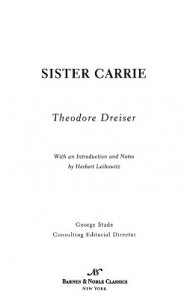Jennie Gerhardt - Драйзер Теодор (книги бесплатно без онлайн .txt) 📗
anywhere she pleases."
"I understand exactly how she feels, Lester. I know how you feel. She is going to suffer very keenly for a while—we all do when we have to give
up the thing we love. But we can get over it, and we do. At least, we can live. She will. It will go hard at first, but after a while she will see how it is, and she won't feel any the worse toward you."
"Jennie will never reproach me, I know that," he replied. "I'm the one who will do the reproaching. I'll be abusing myself for some time. The
trouble is with my particular turn of mind. I can't tell, for the life of me, how much of this disturbing feeling of mine is habit—the condition that
I'm accustomed to—and how much is sympathy. I sometimes think I'm
the most pointless individual in the world. I think too much."
"Poor Lester!" she said tenderly. "Well, I understand for one. You're lonely living where you are, aren't you?"
"I am that," he replied.
"Why not come and spend a few days down at West Baden? I'm going
there."
"When?" he inquired.
"Next Tuesday."
"Let me see," he replied. "I'm not sure that I can." He consulted his notebook. "I could come Thursday, for a few days."
"Why not do that? You need company. We can walk and talk things out
down there. Will you?"
"Yes, I will," he replied.
She came toward him, trailing a lavender lounging robe. "You're such a solemn philosopher, sir," she observed comfortably, "working through all the ramifications of things. Why do you? You were always like that."
"I can't help it," he replied. "It's my nature to think."
"Well, one thing I know—" and she tweaked his ear gently. "You're not going to make another mistake through sympathy if I can help it," she said daringly. "You're going to stay disentangled long enough to give yourself a chance to think out what you want to do. You must. And I wish
for one thing you'd take over the management of my affairs. You could
advise me so much better than my lawyer."
He arose and walked to the window, turning to look back at her solemnly.
"I know what you want," he said doggedly.
"And why shouldn't I?" she demanded, again approaching him. She looked at him pleadingly, defiantly. "Yes, why shouldn't I?"
"You don't know what you're doing," he grumbled; but he kept on looking at her; she stood there, attractive as a woman of her age could be, wise, considerate, full of friendship and affection.
"Letty," he said. "You ought not to want to marry me. I'm not worth it.
Really I'm not. I'm too cynical. Too indifferent. It won't be worth anything in the long run."
"It will be worth something to me," she insisted. "I know what you are.
Anyhow, I don't care. I want you!"
He took her hands, then her arms. Finally he drew her to him, and put his arms about her waist. "Poor Letty!" he said; "I'm not worth it. You'll be sorry."
"No, I'll not," she replied. "I know what I'm doing. I don't care what you think you are worth." She laid her cheek on his shoulder. "I want you."
"If you keep on I venture to say you'll have me," he returned. He bent and kissed her.
"Oh," she exclaimed, and hid her hot face against his breast.
"This is bad business," he thought, even as he held her within the circle of his arms. "It isn't what I ought to be doing."
Still he held her, and now when she offered her lips coaxingly he kissed
her again and again.
CHAPTER LVI
It is difficult to say whether Lester might not have returned to Jennie
after all but for certain influential factors. After a time, with his control of his portion of the estate firmly settled in his hands and the storm of
original feeling forgotten, he was well aware that diplomacy—if he
ignored his natural tendency to fulfil even implied obligations—could
readily bring about an arrangement whereby he and Jennie could be
together. But he was haunted by the sense of what might be called an
important social opportunity in the form of Mrs. Gerald. He was
compelled to set over against his natural tendency toward Jennie a
consciousness of what he was ignoring in the personality and fortunes of
her rival, who was one of the most significant and interesting figures on the social horizon. For think as he would, these two women were now
persistently opposed in his consciousness. The one polished, sympathetic, philosophic—schooled in all the niceties of polite society, and with the
means to gratify her every wish; the other natural, sympathetic, emotional with no schooling in the ways of polite society, but with a feeling for the beauty of life and the lovely things in human relationship which made her beyond any question an exceptional woman. Mrs. Gerald saw it and
admitted it. Her criticism of Lester's relationship with Jennie was not that she was not worth while, but that conditions made it impolitic. On the
other hand, union with her was an ideal climax for his social aspirations.
This would bring everything out right. He would be as happy with her as
he would be with Jennie—almost—and he would have the satisfaction of
knowing that this Western social and financial world held no more
significant figure than himself. It was not wise to delay either this latter excellent solution of his material problems, and after thinking it over long and seriously he finally concluded that he would not. He had already
done Jennie the irreparable wrong of leaving her. What difference did it
make if he did this also? She was possessed of everything she could
possibly want outside of himself. She had herself deemed it advisable for him to leave. By such figments of the brain, in the face of unsettled and disturbing conditions, he was becoming used to the idea of a new
alliance.
The thing which prevented an eventual resumption of relationship in
some form with Jennie was the constant presence of Mrs. Gerald.
Circumstances conspired to make her the logical solution of his mental
quandary at this time. Alone he could do nothing save to make visits here and there, and he did not care to do that. He was too indifferent mentally to gather about him as a bachelor that atmosphere which he enjoyed and
which a woman like Mrs. Gerald could so readily provide. United with
her it was simple enough. Their home then, wherever it was, would be
full of clever people. He would need to do little save to appear and enjoy it. She understood quite as well as any one how he liked to live. She
enjoyed to meet the people he enjoyed meeting. There were so many
things they could do together nicely. He visited West Baden at the same
time she did, as she suggested. He gave himself over to her in Chicago for dinners, parties, drives. Her house was quite as much his own as hers—
she made him feel so. She talked to him about her affairs, showing him
exactly how they stood and why she wished him to intervene in this and
that matter. She did not wish him to be much alone. She did not want him
to think or regret. She came to represent to him comfort, forgetfulness,
rest from care. With the others he visited at her house occasionally, and it gradually became rumoured about that he would marry her. Because of
the fact that there had been so much discussion of his previous




